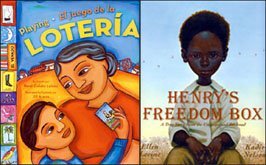A prominent literacy organization is launching a campaign to tackle the achievement gap between minority youngsters and their white peers through workshops, an interactive Web site, and collections of children’s books that reflect diverse backgrounds.
Through its Multicultural Literacy Campaign, unveiled June 13, the Washington-based Reading Is Fundamental, or RIF, is offering literacy training for parents and caregivers and instructional resources for preschool children. The organization’s Web site, www.rif.org, includes free literacy resources, such as stories, nursery rhymes, and other activities to help parents build skills in their children that are considered precursors to reading.
RIF will donate collections of 250 books to kindergarten classrooms in low-income areas. The books include those with themes related to African-American, Hispanic, Asian, and Native American children, and some written in Spanish and other languages.

“As a country, we cannot let so many students fall behind,” Claude Mayberry Jr., the founder and chief executive officer of Science Weekly and the chairman of the RIF Multicultural Advisory Board, said in a statement. “This RIF campaign is the start of a renewed effort to engage parents, caregivers, community organizations, educators, and corporations in a comprehensive approach to improving literacy outcomes among African-American, Hispanic, and Native American communities.”
The campaign is financed through federal grants and corporate donations. RIF will work with the National Black Child Development Institute, also based in Washington, to conduct training sessions for child-care providers who work with African-American children from low-income families.
For background, previous stories, and Web links, see Reading.




